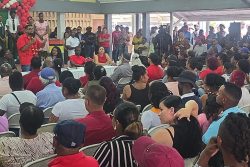Diwali is an opportunity for introspection–we must think about what we are doing for the betterment of our community and what part are we playing in the narrative of good over evil, light over darkness, knowledge over ignorance and hope over despair. It is not a festival of noise.’
 A few days ago we celebrated Diwali, the festival of lights, which signifies the triumph of good over evil, hope over despair and knowledge over ignorance. A festival of its kind is necessary in Guyana. The evil that permeates this land faces us daily. The despair many people are feeling is communicated verbally or by their actions. The various levels of ignorance create animosity, frustration and disrespect. Diwali is an opportunity not just for Hindus but the population as a whole to acknowledge our past and present, be honest about the issues we are facing, think of solutions and be the change we want to see.
A few days ago we celebrated Diwali, the festival of lights, which signifies the triumph of good over evil, hope over despair and knowledge over ignorance. A festival of its kind is necessary in Guyana. The evil that permeates this land faces us daily. The despair many people are feeling is communicated verbally or by their actions. The various levels of ignorance create animosity, frustration and disrespect. Diwali is an opportunity not just for Hindus but the population as a whole to acknowledge our past and present, be honest about the issues we are facing, think of solutions and be the change we want to see.
It was always one of my favourite holidays. Though I am from a different culture, it was meaningful that in school we were taught not only about Diwali, but all religious and cultural holidays. The story of the return of Lord Rama and his family from exile and the diyas being lit to light their path was one that was fascinating and it has remained in my memory.
On Diwali nights, my sisters and I used to look forward to the blackout–it was the one night of the year that we didn’t mind it. We used to ponder about whether it was indeed the darkest night of the year and marvel at how beautiful the houses looked decorated with diyas. The boys in our community would light tyres and pull them in the streets and somehow that was fun for us to witness as children.
As I matured, I developed a greater appreciation of what Diwali means and was grateful for the message being a universal one–a message that is relevant for the time we are living in and that is also infinite.
Unfortunately, disregard for others and imprudence, in the form of noise nuisance, abound around the time Diwali is celebrated in Guyana. This practice emanates from members of the general population.
Celebrating each other’s cultures is important for national cohesion. I do not have a problem with fireworks to mark any occasion. On New Year’s, for example, it is a joy to watch the lights decorating the air, compliments of the Guyana Defence Force. But those fireworks only last a few minutes and then it is done. One does not have to worry about being disturbed throughout the day and night by the booming and sparks in the air. During Diwali and Christmas, however, there seems to be no thought as to how the constant explosions, many of which last late into the night, affect people not involved in the practice; no consideration is given for the animals that run and hide because they are petrified; and there seems to be little thought about safety. The inconsiderate folks not only use Diwali as an excuse to cause disturbance but in many cases they deliberately put other people in danger.
There are many times when I witnessed explosives being thrown at other people and I can also speak of my own experiences. As I walked in my street last Sunday night, two boys, mid-teens, were approaching me when they lit a squib, threw it just a few feet away from where I was and ran off laughing. A few years ago, folks in the neighbourhood were playing with explosives when one landed on the roof of my home. Whether it was deliberately thrown or an accident was never determined but my fear of the house burning down was accompanied by anger. Yet the excuse often heard is that “it is just fun.” Is it fun when someone’s fingers are blown off? Is it fun when someone gets burned?
Is it fun when the squibs explode in one’s face and results in blindness? The situation also begs another question: Why do we still have this problem when years ago the previous government banned explosives? Maybe banned does not mean the same in Guyana as it does to the rest of the world because every Diwali and Christmas, as you move around the city, explosives are on display for sale. No one is going into a dark alley at night to purchase them. From observation, the people selling do not appear to try to hide them. So why is it allowed? The law enforcement personnel cannot say that they do not hear the explosions late into the night. They cannot say that they do not see folks selling them. Why is there not greater effort to stop the importation and sale of these banned items?
This year, many people complained once again about the noise. But the disturbances around Diwali and Christmas remind us about the general attitude when it comes to noise nuisance. There seems to be great tolerance from a large section of the population; the ‘bashments’ in residential areas—some of which last past two in the morning—without a thought as to the effect on the inhabitants, the madness of mini-buses as well as some private vehicles blasting the latest dancehall music are all proof.
It is sad to say but we are living in a society populated by many with a disposition for hooliganism. Even the sacred aspects of culture have been affected by what appears to be the need by some people to disturb the peace. What is unfortunate is that when we need to make noise, often times there is silence; when we need to speak up about the ills in our society or about injustice, most turn away.
Diwali is a festival about triumph and should be respected as such by all. It is not an excuse to thoughtlessly act out fantasies about detonating bombs. Christmas is not very far away and unfortunately we will have to deal with the same issue again unless we actively move to see that the law of the land is enforced. If we are being disturbed, we have a right to confront the offenders in a sensible manner. We must demand that law enforcement officers do their job in seeing that the supply of explosives is prohibited.
I also challenge those who engage in the practice of setting off explosives to consider their neighbours. Think about those who might be sick. Think about the children who are observing such behaviour and are likely to repeat it. Think about the animals. Think about general safety.
Diwali is an opportunity for introspection–we must think about what we are doing for the betterment of our community and what part we are playing in the narrative of good over evil, light over darkness, knowledge over ignorance and hope over despair. It is not a festival of noise.








